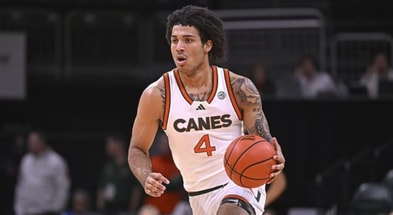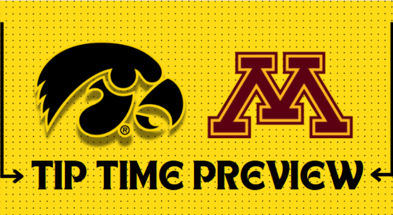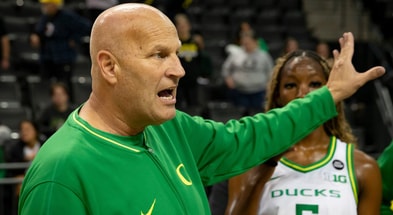Lisa Bluder meets with the media ahead of the Final Four

LISA BLUDER OPENING STATEMENT: Well, we are extremely excited to represent Hawkeye nation here at the women’s Final Four. We know we have an incredible challenge ahead of us, but at the same time, everybody loves an underdog. So hopefully a lot of people will be cheering for us.
I’ve been coming to the Final Four for a long, long time, but my seats are finally going to be pretty good tonight. So I’m excited about that. Excited also about Caitlin obviously being named the AP Player of the Year today. One of my assistants, Coach Jan Jensen, will also be getting the Assistant Coach of the Year Award. So a lot of great things happening.
I’m just trying to convince my team 40 minutes of basketball and a lifetime of memories, and that’s all we have to focus on.
Q. Two-part question. I know you said you got a text from Vivian right after you guys advanced. Have you talked to her since then, and has it also sunk in that Iowa’s here for the first time in 30 years and you obviously know the history of the program from your time there and before that, what it means to have Iowa back on this national stage?
LISA BLUDER: It wasn’t a text, it was a voice message, which tells you the age of both of us. Who leaves voice messages anymore? But I love voice messages because you can hear the enthusiasm in their voice versus reading it on a text, and she definitely had a lot of enthusiasm.
Her love for the Hawks is strong, and I’m thankful — you were talking about mentors, and for the players, Vivian was certainly one of mine. So I’m very thankful to have her support, as the last person that took this team to a Final Four. That really means a lot.
To take our team back here, sometimes as a coach, when you’re at some place for so long, it does get a little old. You’re like, well, it’s been since ’93 since they’ve been in the Final Four. So, yes, it feels good to be back here again, absolutely. But it’s always the people that you’re around.
To me, this group of women are special. That’s what makes the year special to me.
Q. You just had a couple players say they’re really glad they get to go to the Final Four because they get to continue to go to practice. To me, that’s amazing. What does that say about the environment you’ve created here?
LISA BLUDER: We love being around each other. We kind of joked about that. We came straight from Seattle and we didn’t go home. We’ve been on the road together for two weeks now, and we’ve enjoyed every minute of it.
If you didn’t like the people you were around, this would be a chore. It would not be much fun. But when you trust the people that you’re around, when you have respect for them, when you know they’re doing their job, it’s such a comforting feeling, and you don’t want it to end.
This has been a fun season for us, and so, yeah, we do not want it to end.
Q. Coaches tend to be — I’ll put this nicely — control freaks, whereas Caitlin seems like she needs a lot of freedom. I’m wondering when you realized that and what that has been like. Like the first time that she pulled up, whether it was in practice or a game, and took a logo shot. What was your response, and how has that process kind of worked itself out?
LISA BLUDER: Her freshman year, I definitely had some times I was pulling my hair out. There’s no doubt about it. Just she had to learn how to play with other players that were good players. In high school she had to do it all on her own. I remember going to her high school games, as she said, and kids yelling “overrated” to her from the stands. I just would love to see them today.
But honestly, she did test us her freshman year. So we had to learn — it was give and take. It wasn’t all controlling what she did because I think, when you try to stifle somebody like that, you’re ruining a little bit of the type of player they are. What she does on her own is special. I think, if you were trying to tell her exactly what a good shot is, because what a good shot for her is totally different than what a good shot for somebody else is. So she has a little separate set of rules, quite honestly, than other people because she can do things other people can’t do.
We had to get her to understand how to play within a system a little bit without putting out the fire of being Caitlin Clark.
Q. I have a question about scouting and game planning: What’s your preference in terms of do you like watching the most recent games of a team? Do you like watching them against teams that you think are similar to you? Do you like watching common opponents? And then how do you get that information to your players in a way that they can use it on the court?
LISA BLUDER: All of the above honestly. We watch recent games. We watch people that play a little bit more like us. And we have a common opponent in Maryland. We also have common opponents in Georgia, but Georgia plays so differently than us, that that wasn’t really a game we were going to focus on.
We’ve been watching film with our players now for a couple days and trying to get them as good a feel. Right now I think it’s like less practice and more mental, more film. You’re not going to get better at boxing out right now. I’m not going to go out in the gym and teach them a skill like that.
What we need to do is be as familiar as we can with our opponent, and that’s what makes it hard in the NCAA Tournament because you don’t know your opponent as well. When you’re going through the Big Ten, you’ve seen them year after year, same coach, same coaching styles, same players. You know those players so well. In the NCAA Tournament, you may only have a couple days to get ready for an opponent, which makes it a lot more difficult.
So a lot of film right now that we push to their iPads and they watch on their own and we watch together as well.
Q. I believe after the Elite Eight you said that Caitlin plays better against better opponents. So I’m curious what you’re expecting from her tomorrow.
LISA BLUDER: I honestly just want to take the pressure off of Caitlin. She just came in here and received all these awards this week. She knows a lot of eyes are going to be upon her, and I want everybody else to step up and help carry that weight for her because that’s a lot. That’s a lot for a 20-year-old.
So I’m just going to try to take the focus off of her as much as I can and put it on the rest of my team because they want to kind of help shoulder that.
Q. Wondering how the strength of the Big Ten this year compares to other years in the time that you’ve been at Iowa, and how the conference’s overall strength helped prepare you and your team for the tournament?
LISA BLUDER: There’s no doubt this was the best year for Women’s Big Ten basketball in a long, long time. We had three out of the eight in the Elite Eight. That’s almost like 40 percent from the Big Ten Conference. We have felt all year long that playing in the Big Ten prepared us.
Now, again, we haven’t played South Carolina yet, but has prepared us on this journey so far. And whatever team that we play, they tried something different.
Well, one of the great coaches we have in the Big Ten has probably tried it against us already. Some of the great athletes in the Big Ten have probably done that already to us.
Top 10
- 1New
Notre Dame DC search
New name emerges
- 2Hot
South Carolina suspension
Flau'Jae Johnson incident results in punishment
- 3
AP Poll Projection
Big shakeup coming to Top 25
- 4
Vanderbilt fined
SEC levies $500k fine
- 5
Jim Knowles
Ohio State DC is on the move
Get the On3 Top 10 to your inbox every morning
By clicking "Subscribe to Newsletter", I agree to On3's Privacy Notice, Terms, and use of my personal information described therein.
I just think playing in such a strong conference as the Big Ten has helped prepare us for this NCAA journey because we’ve seen it all.
Q. Kind of a two-part question I asked Caitlin. This game has been built up as a Caitlin Clark versus Aliyah Boston just because of the National Player of the Year discussions. Does that feel like a slight to both teams just because both teams do have good players around them? Then second part, what do the players around Caitlin on your team have to do tomorrow to make sure that you guys have a chance to win?
LISA BLUDER: People compare Caitlin to Aliyah, and to me that’s apples to oranges. It makes no sense. They are completely different players. They are completely different positions. They’re both great at what they do, but what they do is different. So I don’t think you can compare the two of them.
They both contribute so much to their team’s success, but to me it’s not Caitlin versus Aliyah. It’s Iowa versus South Carolina, and we have to continue to remember that.
What we need to do to be successful is we have to make sure we box out. We have to make sure that other people are hitting threes and not just Caitlin.
Q. The women’s tournament has grown so much in the past few years, but what would you like to see the NCAA continue to invest in for the Final Four specifically so that it grows even more?
LISA BLUDER: The growth this year has been amazing. I’m sure that, if they would have had a crystal ball a long time ago, they would have not signed this contract that we’re dealing with today in being undersold for our product.
They grouped us with a bunch of other sports, which at the time maybe seemed like a good idea, but with the growth that we’ve had over the last ten years, we have short-changed ourselves. So I’d like to see that change coming with the big TV contracts. I’d like to see also teams being paid for their success in the NCAA Tournament like we have on the men’s side.
Athletic directors are going to invest where they get something back from it. I think at Iowa with our fan base, we’ve gotten something back from women’s basketball. Certainly notoriety as well as fans in the stands being the second best populated fan base we have in the country.
But if AD’s knew, hey, if my team makes it to the NCAA Tournament and I get a little money from that, it would help some of them invest, if they’re not completely vested in women’s basketball now.
Q. Obviously when you’re playing a team like South Carolina, who’s as deep as they are and who can rely on their bench like they can, how does that change your preparation?
LISA BLUDER: It really doesn’t change our preparation, just because we’re not suddenly going to be able to make our team deeper or do things differently. At this time of year, I think, if you start changing things, if you start — you know, you have to tweak things, but if you start making wholesale changes, you’re setting yourself up for failure because that’s just abnormal behavior, and the team is going to recognize that in you and think, uh-oh, something’s wrong. If she needs to change all this right now, something’s wrong.
But you’re right, the depth on their team is amazing. The height on their team is amazing. Obviously they’ve got tremendous coaches, including a former Iowa Hawkeye, I have to say, Jolette Law, wearing the black and gold. I had to tease her last night to make sure she had her black and gold shorts underneath that Gamecocks.
Q. This is a followup to the connection about the growth of the tournament. We’re also seeing women athletes be more present socially, like Dawn is doing AFLAC commercials with Coach K. We’re seeing women’s basketball players doing commercials for Gatorade and other companies. What has it been like to watch that progression? And what kind of message should that send to, whether it’s the NCAA, athletic directors, even young girls who are trying to decide if they want to play sports or want to stay in sports?
LISA BLUDER: You have to be naive right now as an athletic director to not see the growth in women’s basketball and the impact that it’s having with businesses and with fan base and with corporate sponsorships and such. I’m going for a walk around the arena a couple days ago, and all of a sudden, Dawn’s flashing down on me, looking above me with the AFLAC commercial.
It’s so good. These players now with NIL, they understand branding. They understand that they have to create a brand for themselves and that they can be very — have their own businesses and become have profitable from that. Why should that not happen? I think it’s a great lesson for them. What college student couldn’t learn a lot from that type of lesson of being able to market themselves?
So I think it’s — I don’t know if that answers your question, but you’d have to be really living in a dark hole to not realize what’s going on with women’s basketball right now.

























